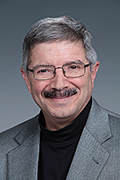 Title: Validation of Asymmetric Cyber Resiliency
Title: Validation of Asymmetric Cyber Resiliency
Abstract: Over the last 50+ years, there has been a continuing cycle of one-upmanship between the cyber attacker and defender. An attack occurs and a response found. The attacker then finds a way around the new fix followed by another defensive fix. This cycle appears to be never ending which leads to the conclusion that the defender will always face new attacks. This has given rise to the research in Cyber Resilience, the ability to continue executing critical functions even in face of a success cyber-attack. PNNL has been a leader in cyber resiliency research over the last 4 years. This presentation will provide the highlights of this research – from a discussion on the cost/value or asymmetric equation to the areas of research to validation of the resulting research. Finally, we close the presentation with just a few of the many research questions still remaining.
Bio: Dr. Nicholas J. Multari is the programmatic and technical lead of a multi-year lab directed research and development initiative focusing on Asymmetric Resilient Cybersecurity at the Pacific Northwest National Lab (PNNL). He develops the multi-disciplinary research agenda required to provide a theoretical basis for, and the application of, technologies that reduce or eliminate a cyber-attacker’s current asymmetric advantage. Prior to joining PNNL, he was the manager for trusted cyber technology at Boeing Research and Technology in Seattle. In 2008, he served as a consultant to the USAF Scientific Advisory Board (SAB) investigating the effects of the contested cyber environment on the USAF mission. Other positions held include five years as a Senior Security Engineer with Scitor Corporation in Northern Virginia, and 20 years as a computer scientist in the Air Force retiring as a Lt. Col. He is a member of external advisory boards at University of Washington and Iowa State University. He received a PhD in computer science from the University of Texas at Austin.